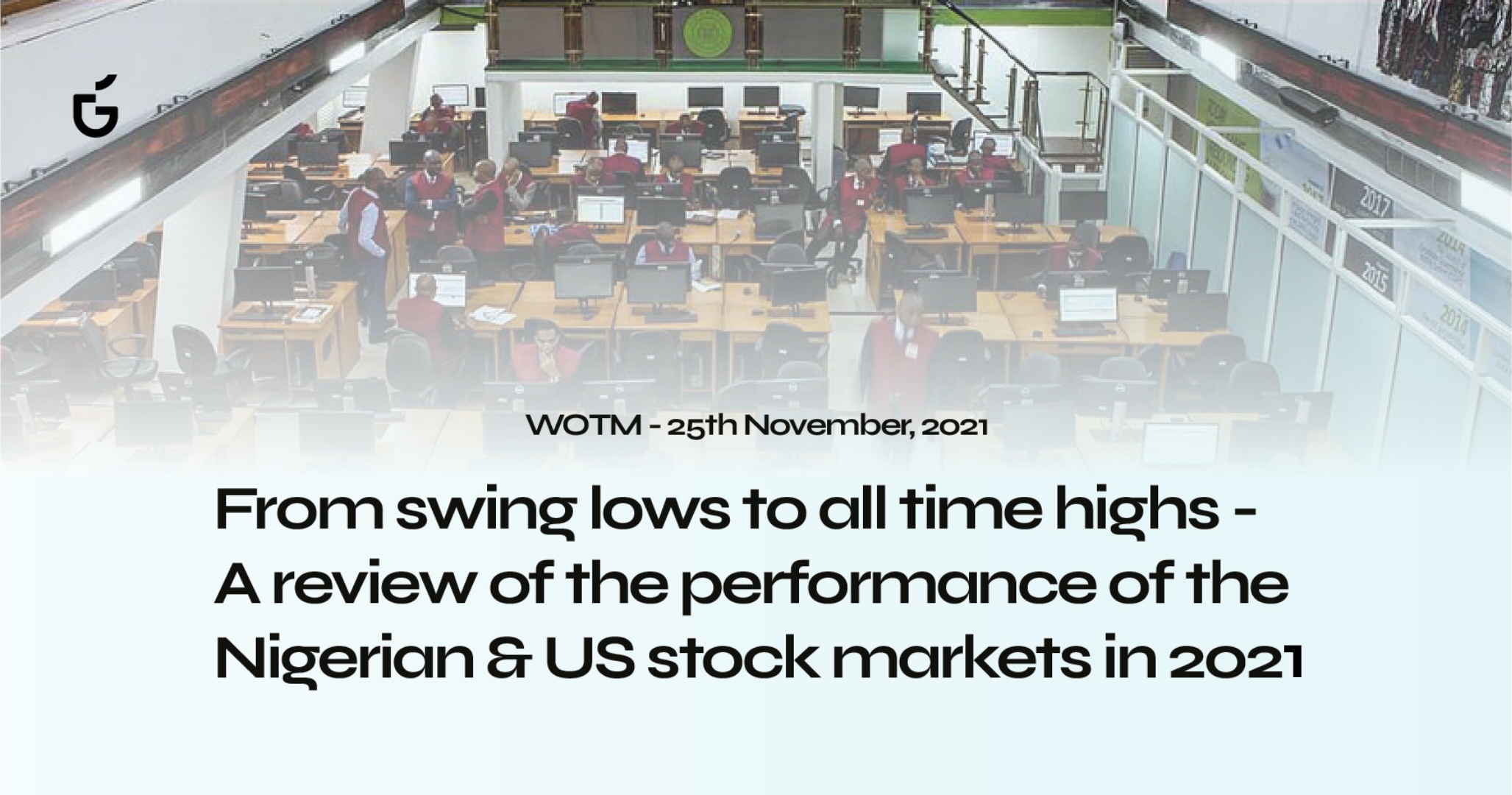 Africa
AfricaUnderstanding how companies are valued – A look into the MainOne acquisition
15 December, 2021
03 June, 2021 | 4 MINS READ
The Stories
Two weeks ago, the Central Bank of Nigeria deleted N379/$ as the official value of the Naira to the dollar from its website. For a short while, no announcements were made as to the official value of the Naira to the dollar. Last week, during the press briefing that followed the bi-monthly Monetary Policy Committee (MPC) meeting, the CBN governor ,Mr Godwin Emefiele, confirmed that the CBN had adopted the Nigerian Autonomous Foreign Exchange Rate (NAFEX) as the new official exchange rate at N410.25/$1.
Last week, the Nigerian National Petroleum Company (NNPC) announced a plan to acquire a 20% minority equity stake in the soon to be completed Dangote Refinery. According to the NNPC’s Chief Operating Officer (COO), Mr Mustapha Yakubu, the acquisition will be done through one of its divisions, Greenfield Refining Projects Division. The COO noted that it now had a strategy to collaborate and seek strategic partnerships with private investors.
Why did the NAFEX became the new official exchange rate?
Nigeria’s dependence on earnings from crude oil export has negatively affected its exchange rate since the early 80s. Whenever oil prices go south, Nigeria’s foreign exchange earnings suffer and the exchange rate takes on multiple prices at different segments.
To explain why this happens, we’ll break down how exchange rate systems work. Exchange rate systems are systems which monetary institutions (i.e. Central banks) manage currency in the foreign exchange market. There are 3 types of exchange rate systems:
Floating Exchange Rate system: Here, the market determines the value of currencies based on how it perceives economic policies will influence growth in comparison with other countries.
Fixed Exchange Rate System: With this system, the government or monetary authority benchmarks the value of its currency to the value of an asset. Usually, the asset to which the currency is benchmarked is stable in value. A common example is a situation in which a currency is pegged to a measure of gold or to the dollar.
Pegged-Float Exchange Rate System: This system combines the features of fixed and floating exchange rate system. The exchange rate is allowed to move within a certain range and as soon as it starts to cross the boundaries of the range or bands, the monetary authority is expected to step in to manage the situation. The bands can be tweaked from time to time to fit into different economic situations.
In Nigeria, the CBN maintains a managed float exchange rate system. This is the same as the pegged-float system. Before June 2016, Nigeria had a fixed exchange rate system i.e., the value of the Naira was tied to the dollar and so whenever oil prices dropped, (Nigeria’s major foreign exchange earner) foreign reserves and the value of the Naira comes under pressure. This is because a fixed exchange rate system requires a country has adequate assets to benchmark its currency to in order to defend the value of its currency. Though a managed float also requires robust reserves, it allows the band within which the exchange rate moves to be adjusted.
For countries that maintain fixed or managed float exchange rate systems, whenever their foreign reserves come under pressure, they introduce capital control measures to reduce the pressure on their foreign exchange reserves. A good example of a capital control measure employed by the CBN is a ban list of over 40 items that cannot access foreign exchange from the central bank. Capital control measures in an import dependent country like Nigeria creates a wide disparity between official and market exchange rates.
The managed float exchange system was introduced in 2016 and as oil prices improved in 2017, the CBN introduced the Investors and Exporters foreign exchange window popularly called the I & E window. At the birth of the I & E window, the Financial Markets Derivative Quotation Over the Counter (FMDQ OTC) securities exchange developed NAFEX. NAFEX is the FMDQ’s reference rate for foreign exchange (“FX”) activities in the Investors’ & Exporters’ FX Window and it’s designed to represent Spot (current) FX market rates in the Window. Though NAFEX is determined by calculating the mean of polled rates from contributing banks, the CBN remains the major supplier of FX in the I & E window and so influences the rate in that widow.
Other segments of the Nigerian foreign exchange market include the Small and Medium Enterprises Investment Scheme (SMEIS) window where importers access forex, the Bureau De Change (BDC) window where forex is sold to retailers and the parallel market.
In 2020, the pandemic brought back pressure on Nigeria’s foreign exchange reserves as oil prices plunged and economic activities stalled. The CBN, in a bid to adjust to prevailing economic realities and close the wide disparity in the different segments of the foreign exchange market, adopted the NAFEX rate as the official exchange rate. Adopting the NAFEX rate means the official exchange rate in Nigeria will be more reflective of prevailing market rate as determined by the CBN.
NNPC and its interest in private refineries
Government-owned refineries in Nigeria have been moribund for years. The government, rather than sell the refineries to interested buyers keep allocating funds to resuscitate these refineries. This has left Nigeria dependent on the importation of refined petroleum products and an oil subsidy the government cannot afford.
In 2013, Alhaji Aliko Dangote announced the intention of Dangote industries to own a refinery, the refinery was to be completed in 2016. Plans changed for a bigger refinery and 2020 was set as completion date. The proposed refinery which is worth about $19.5bn will refine 650,000 barrels of oil per day which is more than the 552,000 barrels currently consumed daily in Nigeria as of March 2021.
The NNPC has shown interest in investing in Dangote refineries and other upcoming private refineries. According to the Corporation, there is a government policy that stipulates the mandatory participation of the NNPC in any privately-owned refinery that exceeds 50,000 barrels per day capacity.
TGIC Research believes the NNPC is interested in owning equity in privately owned refineries to shore up demand for Nigeria’s crude. The international market for oil has been plagued with an oversupply in recent times, the US used to be Nigeria’s biggest crude buyer but that changed after the discovery of shale oil. Nigeria now looks to Asian countries (India & China) to buy its crude.
One of the reasons for Nigeria’s declining reserves is a low demand for its crude in the international market. Privately owned local refineries open up a new market for the NNPC to explore.
The corporation is also looking to become a net exporter (exporting more than importing) of refined petroleum products to other West African countries. This we think is the reason the NNPC has refused to sell state owned refineries. The government recently approved $1.5 billion to revamp two NNPC-owned facilities in Port Harcourt that have the capacity to refine 210,000 barrels of crude per day.
With the effect of exchange rate on pump prices, how likely is it that private refineries will sell refined crude at state determined prices?
According to the Minister of Finance, Budget and National Planning, Zainab Ahmed, price controls have held back the growth of private petroleum refineries in Nigeria. She mentioned that licenses for refineries have been issued years before now, but the owners of these licenses have been reluctant to build refineries because of the fear of price controls.
The Dangote refinery is located in an Export Processing Zone and according to the Minister, this insulates it from price controls. The refinery is free to sell refined crude at the international market price. She stated clearly in a TV interview in September 2020 that Nigeria will buy refined oil from Dangote Refineries at the international market price, the only difference is, there will be no shipping cost. So private refineries will not significantly reduce the pump price of petrol in Nigeria since they are free from price controls.
However, should the NNPC be able to acquire equity stake in these companies and sell crude to them, it might be able to reach an agreement with the refineries on a favorable price for refined crude.
How Does this Affect Me as an Investor?
The NNPC’s ambition of becoming a net exporter of refined petroleum products in West Africa tells us the government is still focused on revenue generation from the oil sector. The NNPC projects that Africa will still use fossil fuel for at least the next 20 years.
Oil prices are subject to the dictates of market forces and the major players (OPEC+) in the international oil market. With the rest of the world moving away from fossil fuels, the future of petrol is dim.
Despite the Nigerian government’s oil ambitions, market forces influence the price of crude oil and this might continue to negatively impact the country’s foreign exchange earnings, which may lead to continuous depreciation and devaluation of the Naira. A depressed Naira reduces the value of Naira denominated assets.
Investors should continue to focus on preserving the value of their portfolios by diversifying and investing in dollar (or other currencies) denominated assets or consider growth investment options with high returns. High returns come with high risk, so be sure to do your research and due diligence before investing in assets with high returns.
TGIC helps its members carry out research on how economic events affect their investment portfolio and also carry out due diligence on its investment partners. You can sign up to join us today.
 Africa
Africa15 December, 2021
 Africa
Africa09 December, 2021
Join the biggest
investment club in Nigeria.